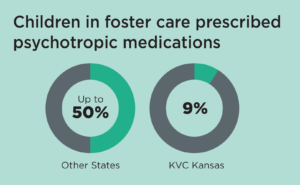Safely Reducing Psychotropic Medication for Youth in Foster Care

How KVC Health Systems Safely Achieved One of the Nation’s Lowest Rates
KVC Health Systems has developed a sophisticated medication monitoring and response system to ensure that the children it serves within the Kansas City Metro and Eastern Regions of the Kansas child welfare system – more than 3,500 in foster care and 5,000 children in home-based programs each day – are safe from inappropriate medication use.
Nationally, the rates of children in the foster care system who are prescribed psychotropic medications are staggering. Rates can be as high as 50% of children on one or more psychotropic medications (ACF, 2012). Additionally, many of the children on medication are being prescribed antipsychotics, which are known to have serious side effects. Armed with this information and working from the KVC value, “What would you want for your child?,” KVC administrators began work on an oversight system in 2012.
Watch this short video:
KVC’s medication tracking system allows for broad oversight as well as the opportunity to drill down to each individual child. Of particular importance is the real-time data generated on each child, as this does not exist within most monitoring systems in Kansas or the nation. This state-of-the-art notification system enables professionals to take action if a child is prescribed a concerning type, dosage or combination of psychotropic medications. As a child is prescribed or changes medication, this information is entered into the KVC data system. The medication information, along with the child’s age, height, weight and other information is filtered against the current formulary database in order to check for any safety concerns. When a concern is identified, an alert is sent out to the child’s case management team, clinical and medical directors. Examples of alerts include:
- Medication type or dosage exceeds threshold for child’s age or weight
- Too many total medications
- Medication without use of adjunct mental health therapy
- No lab provided and child is on medication that requires labs
- Child has been stable for 6 or more months without consideration of safe reduction in medication
The child’s information is reviewed and a response plan is formulated. Responses can range from a phone call to the prescriber to discuss a potential concern to a same day appointment with a KVC child psychiatrist.
 “We always know, in real-time, the details of psychotropic drug use among the children we serve,” said Dr. Linda Bass, Vice President of Clinical Services and Wellbeing for KVC Kansas. “Our in-house developers have built a robust system that gives us the information we need at the individual and macro levels. Our goal is to not only detect concerns, but also to safely reduce the use of psychotropic medication among youth in foster care. I’m proud to say that we are achieving that.”
“We always know, in real-time, the details of psychotropic drug use among the children we serve,” said Dr. Linda Bass, Vice President of Clinical Services and Wellbeing for KVC Kansas. “Our in-house developers have built a robust system that gives us the information we need at the individual and macro levels. Our goal is to not only detect concerns, but also to safely reduce the use of psychotropic medication among youth in foster care. I’m proud to say that we are achieving that.”
In addition to responding to concerns with an individual child, the KVC system creates a series of aggregate reports that are reviewed by administrators each month. Trends are reviewed and changes in practice are made as needed. Examples of reports include:
- Trends by age
- Trends by gender
- Trends by placement type
- Trends by class of medication
- Trends by number of medications
- Trends by prescriber
In addition to the tracking and alert systems, KVC medical director and staff psychiatrists/APRNs provide ongoing training to the case management teams about the use of psychotropic medication in children. Armed with valuable information, KVC front line staff is better equipped to advocate for safe reduction and strong oversight of medication. KVC staff is also able to help caregivers and children better understand the role of medication in their lives.
The work done by KVC over the past three years is paying off. The number of children on psychotropic medications across all KVC Kansas programs is less than 9%, only a fraction of the number that many other foster care programs experience. Other noteworthy outcomes include:
- Less than 1% of children on medication are under the age of 5
- Less than 4% on two or more medications from the same class
- No children on three or more from the same class
- Less than 1% of children on 5 or more total medications (0.3%)
- More than 90% of children on medication are also actively involved in mental health therapy
For more information on KVC’s Medication Tracking and Response system please contact: Dr. Linda Bass, Vice President of Clinical Services and Wellbeing for KVC Kansas, at lbbass@kvc.org.




